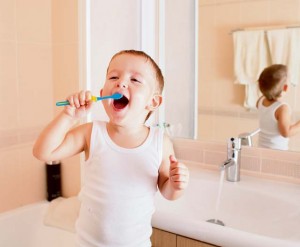Many parents have a difficult time determining when and how much dental care their children need throughout their development, however, the 86th Dental Squadron has tips to care for children’s teeth in order for them to maintain a beautiful, healthy smile.
The Ramstein Dental Clinic is holding a Little Teeth, Big Smiles clinic from 7:30 a.m. to noon Nov. 16 to provide dental care and information to toddlers and children up to 10 years old.

The 86th Dental Squadron hosts the Little Teeth, Big Smiles weekend dental clinic from 7:30 a.m. to noon
Nov. 16 to provide dental care and information to toddlers and children.
By appointment only, dental workers will be on hand to provide exams, cleanings, X-rays if needed, and educational services to interested parents.
Preventing cavities and helping children develop healthy oral hygiene practices starts with understanding that children’s dental needs will constantly change. Beginning stages of oral hygiene includes healthier eating and drinking habits. Exposure to sugars for long periods of time can cause early childhood cavities, a disease that can quickly destroy a child’s teeth.
Acids produced by bacteria can cause decay if they remain on the teeth too long and are not brushed away. This can be due to children drinking from a sippy cup or bottle that contains milk or juice. Preventing this disease is not always about what a child is eating or drinking, but how often they are drinking it.
It is suggested to give a child milk or juice all at once and then have them drink water the rest of the day.
The American Dental Association recommends:
• Don’t put a baby to bed with a bottle unless it is filled with plain water. Even watered-down fruit juice or milk can increase the risk of decay.
• Talk with a doctor about weaning an infant from the bottle when he or she is 12 to 14 months old.
• Don’t dip a baby’s pacifier in sugar or sugary liquids.
• Don’t add sugar to a child’s food.
• Clean a baby’s teeth and gums with a damp cloth or a soft toothbrush after each feeding.
• Take a baby to the dentist as soon as the first tooth appears.
• Teach a baby to drink from a cup by his or her first birthday.
• Make sure a baby is getting the right amount of fluoride. If drinking water does not contain fluoride, ask a doctor or dentist about fluoride supplements.
It is important to take good care of a child’s baby teeth. The Oral and Dental Health Resource Center website states that baby teeth play an important role by helping children speak clearly, bite and chew food. Baby teeth also save space for the permanent teeth and help guide them into place.
When caring for a child’s teeth, parents should:
• Wipe a child’s gums with a clean, damp gauze or washcloth.
• Once a child’s teeth come in, brush them twice a day using fluoridated toothpaste.
• Use a soft, age-appropriate toothbrush.
• Use a small amount of toothpaste to brush teeth of a child under 2 years old.
• Between 2 and 5 years old, dispense a pea-size amount of toothpaste and perform or assist your child’s tooth brushing.
• As soon as two teeth touch each other, floss between them once a day.
• Talk to a doctor or dentist about fluoride if your child drinks water that isn’t fluoridated.
• Brush a child’s teeth a second time. Most children won’t be able to brush their teeth well on their own until they are about 8 years old.
• Children who are at high risk for cavities can get sealants placed on their teeth. Sealants are placed over the grooves of teeth to protect them from decay.
Encouraging healthy habits goes a long way. Make dental visits enjoyable for a child. Set a good example by taking care of your own personal oral hygiene and health. Encourage brushing and flossing. Give a child healthy snacks such as fresh fruits, vegetables and cheeses.
For more information or to schedule an appointment, call the dental clinic at 479-2210.


